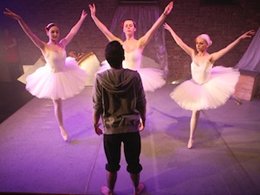Smock Alley Boys School is, perhaps, the most atmospheric theatre in the city. With its exposed brick, declining gangway and multi-storey viewpoints it brings to mind one of those Victorian Asylums where the public used to come to observe the mentally ill. Hence, it lends itself to plays that delve into the mind, that excavate fractured psyches and mount them as art. But the building often bears the burden when companies become overwhelmed by the possibilities the space provides and forget that the play is the thing. This is the case for Maylin Productions and The Dead Woman's Son.
Boy (Rua O'Donnachu, who also wrote the script) has abducted Girl (Andrea Cleary) and taken her to some unknown place. Mirrors are shattered and dispersed throughout the venue, plastic is flung over the chairs we will later be invited to sit upon, and dust dances in the floodlights. Having witnessed his mother's death at the age of eight and suffered a continual cycle of traumas ever since, Boy has retreated into his mind, reliving and reimagining the events that have shaped his existence to this point.
He and Girl trade random statements, psychological theories you hope might later make sense. He is distracted, looking up to the gods and mumbling opaque statements like "We have time" or "They won't be long now". She moves from clinically curious to awkwardly petrified. But the many, long scenes featuring the pair alone lack a sense of connection, either between the actors themselves or betwixt them and the text.
 Rather than imparting a sense of confusion from her disorientation, Girl simply leaves the audience confused, as if Cleary knows her lines but hasn’t worked through their purpose with director Michael McCabe. And when Boy responds to her panicked questions with even more questions, there seems to be no intention behind what the actor is doing. It comes across as being deliberately obfuscated and the piece eventually becomes limp, a tired back and forth of disconnected psychobabble.
Rather than imparting a sense of confusion from her disorientation, Girl simply leaves the audience confused, as if Cleary knows her lines but hasn’t worked through their purpose with director Michael McCabe. And when Boy responds to her panicked questions with even more questions, there seems to be no intention behind what the actor is doing. It comes across as being deliberately obfuscated and the piece eventually becomes limp, a tired back and forth of disconnected psychobabble.
A seeming condemnation of the cold, faceless workings of psychiatry, it is most alive when a chorus of comically cruel doctors occupies the stage, with their formal to excitable speech and emotional remove a grotesque substitute for the love and affection Boy has missed out on. It is contrasted brilliantly with Boy's imagining of his parents' first date and his fantastical vision of bringing a girl home for the first time – the odd language and violent twists employed by the playwright showing the warped view the character has been left with after his father abandons him to care.
In fact, almost every scene involving the supporting cast is a delight. But while these scenes best project Boy's yearning and disorientation, the – at times, inappropriate – laughter from the stalls suggests that the audience was more relieved to be given a reprieve from the more contrived elements of the play rather than questioning the purpose of their often bizarre appearances. The screaming ballerinas? Or the interviewer who pops out of the box and indulges in what looks like interpretive dance to the beat of his own words? Or the masked orchestra? Plenty of moments in The Dead Woman’s Son were left open to interpretation but, striking though they were, they mystified the audience without actually servicing the plot. And while Director Michael McCabe's production is one of the more visually compelling productions I have seen in a while, he fails to convince us that he himself knows exactly what O’Donnachu is trying to say.
That the language sounds like it comes straight from a psychological textbook is a sucker punch The Dead Woman’s Son cannot recover from, and the way the two leads convey everything in the one voice kicks it when it’s down. At half its playing time and with performances that were more confident and clued in, it could have possessed a Lynchian quality. As is, it's a tough slug with memorable abstractions.
Caomhan Keane is a freelance journalist who has written about theatre for The Irish Times and the Sunday Independent and is senior theatre writer at entertainment.ie